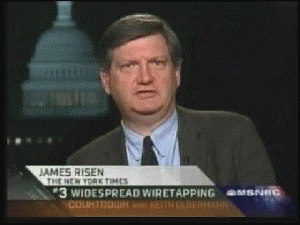Reprinted from dissenter.firedoglake.com
The Justice Department under President Barack Obama insists a journalist must testify against his source so they can prosecute and convict a former CIA officer for a leak. It has spent about six years trying to force him to testify, and now, having lost in an appeals court, he is taking his case to the Supreme Court.
Former CIA officer Jeffrey Sterling is alleged to have given information to New York Times reporter James Risen on a classified program "intended to impede Iran's efforts to acquire or develop nuclear weapons," which he later published in his book, State of War.
Risen moved to quash a grand jury subpoena in January 2008, which a district court granted in part. The court found he his testimony was "unnecessary" and "the icing on the cake" for an indictment of Sterling. The court still permitted the government to question Risen on his conmmunications with a "third party" on an "alleged confidential source." Risen and the government moved for reconsideration of this ruling, but, when the grand jury expired, the subpoenas were nullified.
On January 19, 2010, Attorney General Eric Holder sought another grand jury subpoena. Issued on April 26, 2010, this one, according to a filing from Risen, "sought not the name(s) of Risen's confidential source(s), but instead extraordinarily detailed information regarding "the where, the what, the how and the when' of all communications with sources for Chapter 9." [The part of his book on "Operation Merlin," a "reportedly botched attempt by the CIA to have a former Russian scientist pass on fake and intentionally flawed nuclear blueprints to Iran."]
Ever since, the Justice Department has been fighting in court to force Risen to give testimony. The courts have been divided, with a district court granting a motion to quash to protect a "confidentiality agreement with his source," a district court limiting the topics which government could question Risen, and an appeals court ruling last year in a split opinion that Risen had no reporter's privilege to protect his confidential sources.
Risen, who remains committed to struggling against the Obama administration in defense of press freedom, has now asked the Supreme Court to hear this case. He told Times public editor Margaret Sullivan:
This case has been transformed into a potential constitutional showdown over the First Amendment and the role of the press in the United States because of the Obama Administration's aggressive use of the powers of the government to try to rein in independent national security reporting. It was the Obama Administration that sought to turn this case into a basic constitutional fight over whether a reporter's privilege exists. It is the Obama Administration that wants to use this case and others like it to intimidate reporters and whistle blowers. But I am appealing to the Supreme Court because it is too dangerous to allow the government to conduct national security policy completely in the dark.
The filing he submitted to the Supreme Court, which asks it to hear the case, reminds the court it has been forty years since it considered a case involving whether journalists have a right to not reveal their confidential sources. That case was Branzburg and it has not brought clarity to the issue.
The "existence and scope of a reporter's privilege in criminal trials is a matter of the highest importance as t to which there is ongoing and irreconcilable disagreement in the lower courts that is well worth plenary review by the court," the filing declares.
It notes the importance of reporters being able to keep the identities of their sources confidential:
"As the record reveals, countless stories of tremendous historical significance--the Watergate break-in and cover up, the abuse of prisoners at Abu Ghraib, Iraq, the CIA's waterboarding of terrorism suspects, the existence of secret CIA prisons in Eastern Europe, the NSA's use of warrantless wiretaps on US citizens and the systematic lack of adequate care for veterans at Walter Reed Army Medical Center to name just a few--would never have been written without the reporter's ability to promise sources confidentiality and keep those promises"
Risen has a history of producing critical reporting on national security issues. State of War, published in 2006, examined secrecy and corruption within US intelligence agencies. It highlighted incompetency in the CIA and questioned whether the agency was effectively preventing Iran from developing weapons of mass destruction.
It was Risen's decision to reveal details of NSA warrantless wiretapping in his own book that eventually pushed the Times to publish a Pulitzer Prize-winning report on this surveillance by Times reporter Eric Lichtblau and him.
As the filing to the Supreme Court points out, 49 of 50 states and Washington, DC, have laws recognizing a reporter's privilege. Thirty-nine states have "shield laws." Of the 12 states without statutory laws, all but one state has recognized this privilege in "one context or another."
(Note: You can view every article as one long page if you sign up as an Advocate Member, or higher).






